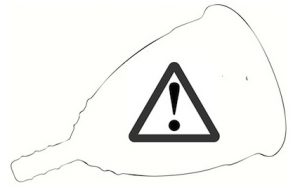Menstrual Cup Dangers – are there any?
 In the article below, we will outline some instances when you shouldn’t use a menstrual cup.
In the article below, we will outline some instances when you shouldn’t use a menstrual cup.
To avoid any potential infection, it is important that proper hygiene and cleaning practices are followed. For example, ensure you always wash your hands before inserting or removing your menstrual cup, and ensure the cup itself (including the stem, rims, and holes) are properly cleaned, and also sterilised from time to time.
It is important to inspect your cup regularly and care for it in accordance with the manufacturers instructions. If your menstrual cup begins to show signs of deterioration, severe discolouration, or develops a sticky or powdery film, then it is advised that you stop using your cup and replace it with a new one. This also applies if you begin to experience irritation while using your cup.
When you should NOT use a menstrual cup
- It is not recommended to use a menstrual cup during intercourse.
- If you have a latex allergy, you should ensure the brand of cup you choose is latex free. Most cups are made from medical grade silicone, however, the Keeper cup is made from Latex and should thus be avoided.
- Immediately after giving birth to a baby, having a miscarriage, or an abortion.
- You should not wear your cup at any time other than during your period.
- If you currently have or have had any gynaecological concerns, you should first consult with your doctor before using a menstrual cup.
When to consult your doctor
You should first consult with your medical practitioner before using a menstrual cup:
- It you have any form of prolapse
- If you are using an IUD (Intra uterine device) or Nuva Ring. While research is showing that the use of menstrual cup with these devices rarely causes problems, it is essential that you check with your doctor first, before using a menstrual cup
- If you have a tilted uterus or if you have been instructed to avoid the use of tampons, following a surgical procedure or for any other medical condition.
- You have any form of gynaecological infection.
If for some reason you begin to experience severe cramping, general pain, burning, irritation, or inflammation in the genital area, or any discomfort while urinating, remove your menstrual cup and consult your doctor.
When using a menstrual cup always read the label and use only as directed.
